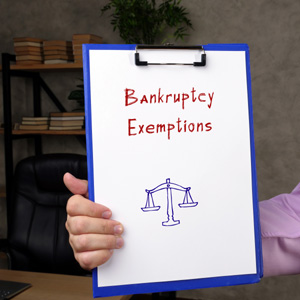How Florida Bankruptcy Exemptions Work

If you are suffering from extensive debt that you are unable to pay, you may feel helpless as you try to understand how to best take the next step. Filing bankruptcy is one option that allows you to achieve a clean slate financially and get back on your feet. While there are advantages to filing bankruptcy, you must be careful when attempting to do things on your own because certain bankruptcy laws may cause you to lose some of your property which you could have used to pay back some or all of your debt. An experienced bankruptcy attorney can explain to you all available bankruptcy chapters, and instruct you on how to best protect your assets depending on your individual goals. In your specific case, you may be eligible for certain exemptions that could allow you to protect some of your property when filing bankruptcy.
The Law Offices of Daryl L. Jones, P.A, is a Florida law firm that is dedicated to helping clients who suffer from unmanageable debts. If you are thinking about filing bankruptcy, it is important that you understand how Florida bankruptcy exemptions work.
Understanding Florida Bankruptcy Exemptions
Regardless of whether you file Chapter 7 or Chapter 13 bankruptcy, you can protect property that is covered by a Florida bankruptcy exemption. However, each chapter treats property that is not covered by an exemption differently. For example:
Chapter 7: If you own property not covered by an exemption, the bankruptcy could may require you to sell those items and distribute the proceeds to your creditors. Alternatively, your bankruptcy attorney may be able to negotiate a payment plan which will allow you to keep those items.
Chapter 13: You get to keep all of your property in a Chapter 13 bankruptcy. With the help of your bankruptcy attorney you can present a payment plan to the court which is based either on the equity of your personal property, or your monthly disposable income after the court takes into account your necessary expenses.
If you and your spouse both own the property in question, this may double the exemption for qualifying properties. This doubling applies for all Florida bankruptcy exemptions except the homestead exemption. The homestead exemption in Florida covers your entire home which is protected from creditors, even if it is paid in full. If you are uncertain which real or personal property you own may qualify as an exemption in Florida, it is important that you consult a knowledgeable bankruptcy attorney.
When Can You Use Florida Bankruptcy Exemptions?
You have the right to file bankruptcy in Florida after you have lived in the state for 180 days. However, you must live here much longer to be eligible for Florida’s exemptions. In order to be eligible for bankruptcy exemptions in Florida, you must have resided in the state for 730 days (or two years) before filing a bankruptcy petition. If you have been in Florida for less than two years, you may still file bankruptcy in Florida but you must use the exemptions from the state where you resided prior to moving to Florida. Some of the Florida bankruptcy exemptions you may be eligible to use when filing bankruptcy include:
Homestead Exemption
As long as your homestead property is no larger than half an acre if located in a municipality, or no larger than 160 acres if located elsewhere, you may exempt an unlimited amount of equity in your primary home or any other property covered by the homestead exemption. You are eligible for this exemption only if you have owned the property for at least 1,215 days before filing bankruptcy.
Personal Property Exemptions
The personal properties that are exempt in Florida bankruptcy cases are:
- Personal property that is valued up to $1,000. This can include furniture, art, and electronics. In addition, if you do not use the homestead exemption, you can exempt personal property valued up to $4,000.
- Retirement plans and 401(K)s
- Retroactive Social Security or Disability payments
- Insurance claims on your homestead
- Education savings accounts
- Prescribed health aids
- Prepaid medical savings account and health savings account deposits
- Tax credits, and
- Some refunds
If you are unsure if your personal property qualifies for a bankruptcy exemption, consult with a bankruptcy lawyer as soon as possible.
Motor Vehicle Exemption
You can exempt up to $1,000 in motor vehicle equity. This amount increases if you are married and filed jointly.
Exemptions for Wages
Wages of the head of the household are exempt up to $750 per week. This applies to paid and unpaid wages and any wages deposited in a bank account during the last six months before filing bankruptcy.
Get Help From a Florida Bankruptcy Lawyer
There are many different exemptions available to individuals who file bankruptcy in the state of Florida. If you are unsure which exemptions you may be eligible for, consult a Florida bankruptcy lawyer for more information.The Law Offices of Daryl L. Jones, P.A, is a Florida bankruptcy law firm uniquely qualified to help clients as they navigate the bankruptcy process in Florida. To set up a free initial strategy session, contact us here or call 305-969-3602.
